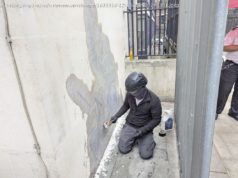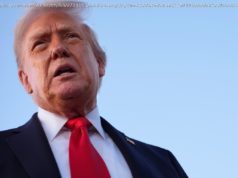A rally of far-right groups and counterprotesters signals the glaring disparity between Portland’s racist history and its image today as a liberal bastion.
PORTLAND, Ore. — When Callista Fink told her father 10 years ago that she was moving to Oregon’s largest city, his response was immediate: “You’re moving to a place with a lot of white supremacists,” Ms. Fink remembered her father saying.
In the years since, Ms. Fink, who grew up in Illinois and works in hospital administration, has not fully convinced her father that he was wrong, despite the prevailing image of Portland as a beacon of tolerance. She has wondered, in her travels around the state, whether a different, more troubling Oregon was never far away, lurking beneath the surface.
That conundrum came to the fore on Saturday. Far-right groups began arriving for a rally on the Willamette River waterfront, with lots of blustery talk of violence. Leftists, many of them masked and apparently equally committed to fight, were prepared to march across town in counterprotest. And the police, in a city where demonstrations routinely turn violent or destructive, were preparing to hold the line against both sides, with a staging area to confiscate weapons and explosives.
Portlandia, as many people call their city, in shrugging resignation or embrace of the caricature from the television comedy by that name, might seem to many Americans the least likely of places to be on the boil as a political caldron. But the deep disparity between where the city began and where it ended up — from an openly racist territorial capital in the 19th century to one of the nation’s most politically progressive cities — has never fully been resolved, or healed.
“It’s still trying to find its identity — that’s why it brings in the extremes,” said Mark Landers, 39, who works for an art supply and framing store.
Mr. Landers said that because Portland did not get as big a wave of immigrants as many other cities did, it remained frozen in place in terms of diversity. “Stuck” was his word for it. Portland is one of the whitest big cities in America, almost 78 percent, and has a smaller percentage of foreign-born residents, according to the census.
The piercing shops and tattoo parlors, the running jokes about everybody being in a band (or preoccupied with “ artisan knots ”), can sometimes obscure the lesser-known aspects of the city’s identity.
“There’s a massive state of denial,” said Randy Blazak, a sociologist and chair of the Oregon Coalition Against Hate Crimes.
Both the left and the right can see the Portland they want to see, and refuse to see the parts they don’t like.
For some, the old image of the nation’s white Northwest — sometimes called Cascadia, a piney, mythical homeland free of immigrants and minorities — lives on as a place worth defending, even though it is now largely a mirage, Mr. Blazak said. And many Oregonians refuse to study or acknowledge the legacy of their history, from the state’s founding to the rise of its Ku Klux Klan in the 1920s to the gentrification and displacement of communities of color today, he said.
Language incorporated by popular referendum in the 1857 State Constitution prohibited blacks from living here, owning property or entering legal contracts, and made Oregon the only non-slavery state admitted into the union with a so-called exclusion clause. The provision was never strictly enforced, historians said. But some racist language remained in the Constitution through as late as 2002. Oregon’s population is still only 2.2 percent black.
“When I talk to people and say Oregon was formed as this whites-only state, there’s this look of ‘How that could possibly be?’” Mr. Blazak said. “People are just shocked that this is our history.”
That history still endures. Skinhead groups rose to prominence here in the 1980s, and last year, a man spouting what witnesses said were racist and anti-Muslim language stabbed two people to death on a transit train.
Oregon for many years deliberately sought to cordon itself off from the rest of the country, and by some measures succeeded. In the early 1970s, Gov. Tom McCall famously urged Americans to come and visit — with a caveat: “But I also ask them, for heaven’s sake, don’t move here to live.” (Some have speculated that Mr. McCall was using reverse psychology: Tell people not to come and they’ll immediately think they’re missing out on something great.)
Insularity, and the idea that some kind of different society — whether racist, utopian, progressive or something else — could be conceived and built at the Northwest fringe of the continent, still runs deep in the culture.
Though Portland is the economic engine of the state, with a majority of the jobs and about 59 percent of the state’s population of 4.1 million living in the metro area, its progressive politics can sometimes come off as hostile to business. That is in stark contrast with Seattle, which to the Northwest is both a rival city to Portland and its polar opposite. Seattle has cultivated for generations the idea that it would one day become a great global city and an economic titan. Portland just doesn’t dream that way.
“Seattle will do anything to promote business,” said Todd Brundage, 51, an investment adviser who said his plan for Saturday’s rally was to stay as far away as possible. “Here, they’re like, ‘Whatever, we couldn’t care less. Stay or go.’”
Divisions over the region’s identity have prompted repeated clashes and protests, especially since the election of President Trump. The rally on Saturday was organized in part by Patriot Prayer, which espouses anti-immigrant rhetoric and obtained a legal permit from the city for the event. A group called Rose City Antifa started in Portland more than a decade ago, and its members, often masked, have shown themselves to be as interested in breaking windows, vandalizing businesses and challenging the police as fighting the right wing.
There is a pattern, and it long predates the recent protests and the election of Mr. Trump: To groups on the fringe, attention is oxygen, and Portland is a great place to get it.






